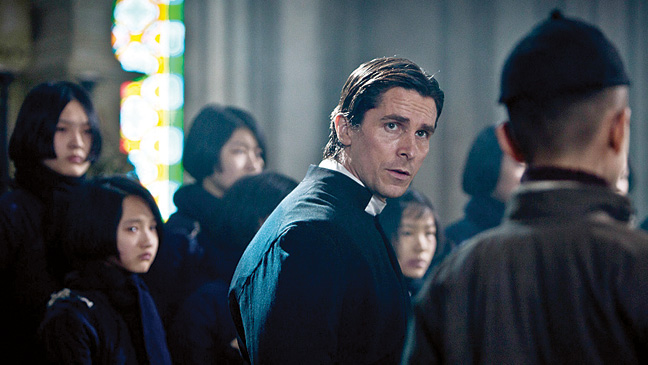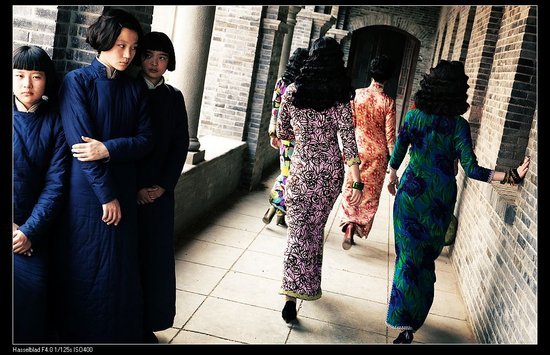Directed by Zhang Yimou
Screenplay by Heng Liu
China, 2011
A select few of China’s most revered filmmakers have, at given moments in their careers, chosen to make headway in the English-language cinema landscape, their sights aimed more specifically at the United States and Hollywood. John Woo’s stint was less than memorable, with Face/Off being his most successful attempt (and few would argue that it is any better than what he made in Hong Kong either before or after his American career). Wong Kar Wai, after making a name for himself with nearly 20 years of great films, headed West as well to make My Blueberry Nights with mixed results to say the least. Zhang Yimou, known mostly for his wuxia-style epics Hero and House of Flying Daggers, does not go to quite the same lengths, preferring to keep his latest film set in China, but have it star one of the West’s most recognizable faces, Christian Bale, and have much of the dialogue exchanges occur in English. Do the more modest steps in trying to woo Western audiences pay off?
The setting is the infamous second World War and the Chinese city of Nanking, unfortunately mostly known to those in the West for being victim of one of that conflict’s greatest atrocities, Holocaust of course notwithstanding. For brevity’s sake, the city was a prime target of the invading Japaneses forces, who hammered it with thunderous force, laying most of its infrastructure to pathetic rubble, slaughtering countless men and women, usually not before humiliating and raping the latter. Director Zhang thrusts the viewer into the thick of the action right from the outset, focusing on four parties who eventually converge in one way or another. They are an alcoholic American mortician named John Miller (Bale), dispatched to a Westernized Catholic cathedral to bury the local priest, a small band of Catholic school girls desperately fleeing Japanese soldiers, a tiny platoon of Chinese soldiers risking their lives in protecting the school girls as they try to make their way back to the aforementioned cathedral, and a party of Nanking’s most famous showgirls, led by Wu Mo (Ni Ni) who are too far from the refuge to ever make it their alive and have thus decided to hide out at, where else, the same cathedral. With so many different personalities stuck under one roof, one wonders if they will manage to survive each other before even considering the Japanese…
With so many different talents, plot threads and ideas thrown into one pot, it is small wonder that The Flowers of War eludes simplified categorization as opposed to more typical war-themed films. The desire to cast of Christian Bale in the lead role can only have emerged out of a desire for director Zhang to gain further prominence in the Western market. Then again, perhaps not. The script has as part of its core an American character, and Bale has proven more than once his adeptness as sliding into American accents, so for all that can be known Zhang Yimou simply wanted the best actor available. Whatever the reason, there is little doubt that the film will receive at least a modestly greater theatrical release than otherwise would be the case. Not only does its trilingual nature add a peculiar quality to the film (Chinese, English and some Japanese), but so does the disparate tone in so many scenes, all the while playing some familiar war film plot tropes audiences have seen many times before. These sometimes self contradictory elements certainly do not make Flowers a poor film. Quite the contrary, there is in fact a fair bit to appreciate, yet it does not run as smoothly as one would like, which does not help its nearly two and a half hour running time.
‘Perhaps the most welcomed strength about the picture is its insistence on developing the arcs for most of the different ‘clans’ that inhabit the world of the film,…
Perhaps the most welcomed strength about the picture is its insistence on developing the arcs for most of the different ‘clans’ that inhabit the world of the film, specifically the American mortician, the Nanking showgirls, with Wu Mo taking a leading role, and of course the innocent school girls, with Shu (Zhang Xinyi) being the one the audience follows most closely. Having John Miller as the sole principle character would have felt like too much pandering, and thankfully Zhang Yimou is a mature enough story teller to understand that all three of those groups require decent screen time because all three own the most critical character arcs. The American is a selfish womanizer at first, wanting nothing more than to take the money owed to him for his job and hopefully bed Wu Mo in the process, while the showgirls and the schoolgirls hate each other guts with a passion for various moral and philosophical reasons. It is a trinity of big egos and prudish mentalities which of course cannot co-exist at first, with the pressures of the war eventually bridging their gaps, enabling them to band together and find a way out of their predicament. The acting is stellar, especially from Ni Ni, who balances her role between two languages, one of which obviously not her native tongue.
This set-up has its deficiencies however, chief among them that any familiarity with movies of this ilk will help the viewer predict, for the most part, how all of this will end. Another flaw, if it may be deemed as such, rests with the depiction of the Japanese soldiers, who definitely get the proverbial shaft when it comes to character development. No one shall pretend that the crimes committed by many of them against their Chinese victims are forgivable (the country’s continuous hesitancy in admitting to their WWII mistakes being a particularly annoying matter), but be that as it may, virtually none of the Japanese characters are given any redeeming qualities, save one (Atsurô Watabe), and even he is revealed as less friendly than originally presented when push comes to shove in the latter stages of the story. They are monsters, and nothing more. Nuance be damned, apparently.
‘Flowers‘ mood from scene to scene is also a bit spastic at times…every once in a while director Zhang will ramp up the action which feels somewhat at odds with the rest of the movie…
Flowers‘ mood from scene to scene is also a little bit spastic at times. Most of the film functions as a solid drama, but every once in a while director Zang will ramp up the action, some of it truly horrific, which feels somewhat at odds with the rest of the movie. Sure enough, the Japanese soldiers cannot resist their barbaric urge to rape the young schoolgirls, hence they barge into the cathedral and proceed to chase after every one of them (as the showgirls effectively hide away) before Miller makes a bold move to rescue them. That in of itself is fine (relatively speaking) and within the context of the story obviously. A later however really goes the extra mile and openly depicts how the Japanese treat two of the showgirls who were foolish enough to venture outside the cathedral walls. The sequence almost plays like an exploitative horror scene. Another rather long sequence features the lone remaining Chinese soldier taking out what must be 20 if not 30 Japanese soldiers through a variety of means like mines and sniping. It lasts about 10 minutes and is probably one of the best action scenes put to screen in quite some time in its editing, its cinematography and merely from an energy boost standpoint, but feels terribly ill at place with the rest of the movie.
What the viewer is left with is a movie with many qualities, such as the acting, the overall story, the sound design (which especially strong in fact), the cinematography, but feels tonally uneven and adheres to a plot that, while interesting, does fall prey to some important cliches. It is not exactly a case where one can write that Zhang Yimou should stick to Chinese cinema, because Flowers is in essence a Chinese movie, but it might be best if he sticks to what he does best, that is, fantastical period pieces.
-Edgar Chaput




